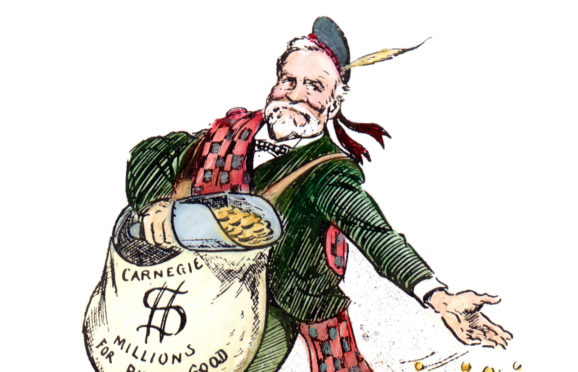
Andrew Carnegie, who died exactly 100 years ago today, is indisputably the world’s greatest-ever philanthropist.
Seven years before his death the Scots-born steel manufacturer had already given away more than 90% of his American-built fortune – an estimated £300 million.
To put that figure into perspective, in today’s money that’s £200 billion and the current largest donors – Bill and Melinda Gates – are unlikely to ever get close to surpassing that.
Carnegie was not just the biggest of the world’s philanthropists but the first modern philanthropist. He is the man whose Gospel Of Wealth set down the principles for giving which his successors – no matter how rich or powerful – have had to be judged against.
So why did he do it? “To die rich,” he said, “was to die disgraced.” My family owes a personal debt to Carnegie. And so do many millions who may never have heard of Carnegie’s giving and may not even know his name.
My father was the first in our family to go to university and coming from a family where, in the depression of the 1930s, his father had only seasonal employment as a farm worker, university was possible only because of a Carnegie scholarship.
And I come from the town next door to Carnegie’s birthplace Dunfermline – to which Carnegie donated the first Carnegie Hall, a swimming pool, a sports centre, a public park – and would have done even more, such as replacing its slum housing, if the town authorities – many of whom were landlords – hadn’t feared he would put them out of business.
But his proudest gifts were a library – opened by his mother – and a college built in his uncle’s honour.
The man who dies rich dies in disgrace – Andrew Carnegie
He single-handedly created the modern public libraries movement, building 3,000 Carnegie Libraries and enabling perhaps 30,000 more libraries to be built, initially in America and the UK, but as far away as Fiji, Mauritius, South Africa and Malaysia.
Soon he was offering to pay for free tuition for poor students.
When he first offered the four ancient Scottish universities cash for free tuition they turned him down. They pleaded that he give the money for new buildings and research instead.
He then had to negotiate a deal to get his way – £1m to them for buildings – so they would reluctantly agree to spend another Carnegie £1m on free tuition.
He supported some of the first scholarships for black students in the American south and he led the way in encouraging women to graduate, offering the first scholarships, too, for women medical students.
There is no class so pitiably wretched as that which possesses money and nothing else – Andrew Carnegie
Why libraries and why free tuition? Carnegie’s plan was to give to “the industrious and ambitious; not those who need everything done for them but those who, being most anxious and able to help themselves, deserve and will be benefited by help from others”.
Indeed many of his libraries, such as the one in Washington, were the only public places where, for decades, black and white people could come together. And so education became central to his Gospel of Wealth for a very particular reason. Carnegie explained: “The fundamental advantage of a library is that it gives nothing for nothing. Youths must acquire knowledge themselves.”
His first library was opened by his mother in his home town of Dunfermline and carried an inscription on the building: Let There Be Light. The second was in his adopted home of Pennsylvania.
But even his generosity came at a price – his donations made on strict conditions that any town receiving his help had to provide land for the library and had to finance all running costs, including the books. Small towns received grants of $10,000 and had to raise the rest themselves.
This was controversial – giving on one hand, demanding something in return on the other.
I resolved to stop accumulating and begin the infinitely more serious and difficult task of wise distribution – Andrew Carnegie
In Burntisland, Fife – to pay for the running costs – they needed to levy a one penny rate, eventually only resolved by a referendum in 1904 when townspeople voted 352 to 251 to finally accept the library.
Carnegie’s key interest was global education. So why, a century later, does education today come well down the league of philanthropic giving? The need for education today is, of course, not less but far greater. In 1900 there were only 250 million children across the world. Today the out-of-school population is 260m children.
Staggeringly, more than 400m finish school before the age of 12 and 800m leave school early without qualifications. A tragic 75% of all secondary-age refugee children don’t go to school at all.
Without education you cannot unlock important social goals – jobs, public health, the environment, gender equality – all depend on people having information and knowledge.
But might today’s Carnegie think not of libraries but of access to the internet? Despite widespread use of mobile phones, only 30% of 15-24 year olds in the poorest countries have internet access and 90% of the unconnected live in Africa or the Indian subcontinent.
While Andrew Carnegie is still remembered and rightfully revered 100 years after his death, now is surely the time to re-invigorate the cause that he passionately believed in and fought for.
The Gospel of Wealth, Gordon Brown’s documentary marking the centenary of Andrew Carnegie’s death, is on BBC Radio 4 and BBC Sounds at 1.30pm today

Enjoy the convenience of having The Sunday Post delivered as a digital ePaper straight to your smartphone, tablet or computer.
Subscribe for only £5.49 a month and enjoy all the benefits of the printed paper as a digital replica.
Subscribe